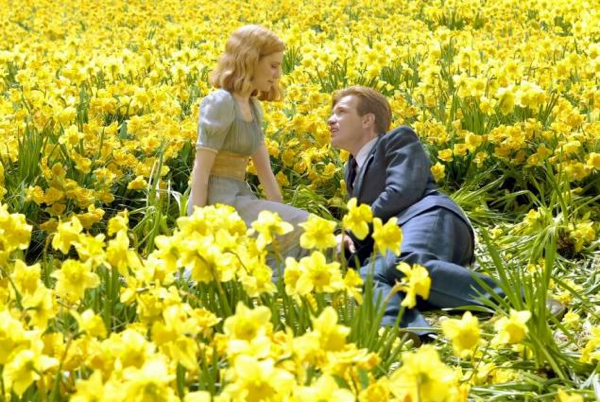Movie review by Greg Carlson
Sadly sentimental and nauseatingly pleased with itself from beginning to end, Tim Burton’s latest exercise in magical (sur)realism fails to enthrall in the manner of the director’s best work – potent stuff like “Ed Wood,” Pee-wee’s Big Adventure,” and “Edward Scissorhands.” Adapted from Daniel Wallace’s novel, “Big Fish” is one of those sprawling quasi-epics where two movie stars are needed to perform each major character: one for the early years version and one for the aging, getting-on view. In this case, Ewan McGregor and Albert Finney play the young and old halves of Edward Bloom, a tireless blowhard who spins fabulous yarns every time he opens his mouth.
Edward’s son, the deliberately-named Will Bloom (played with a clenched jaw by Billy Crudup) has grown to resent his father’s falsehoods and reluctantly flies home from France when he learns that his old man is dying. The two have not spoken in years, and Edward’s impending demise presents the textbook device that allows for copious flashbacks and an inevitable deathbed reconciliation. If nothing else, viewers can take comfort in Burton’s eagerness to dig in to Edward’s colorful fibs, as they offer the only relief from dullsville that “Big Fish” can muster.
Like Mark Twain with plenty of P.T. Barnum thrown in for good measure, Edward’s phantasmagoric biography plows through a series of vivid vignettes, which McGregor handles with a goofy grin and a not-too-horrible Southern twang. We get to meet a cyclopean witch, whose milky dead eye can reveal one’s manner of death. We learn how Edward befriends a hungry giant. We see Edward join a circus led by a lycanthropic ringmaster (played by Danny DeVito). We visit an enchanting hamlet named Spectre in which all the citizens walk barefoot on a lush carpet of bluegrass. There is virtually no limit to the number of impossible images Burton can conjure.
There is, however, a pall that settles over the movie rather quickly when it becomes painfully apparent that Bloom’s fish stories are going to add up to absolutely nothing. Will’s desperate attempt to learn the “truth” from his father is obscured by Edward’s relentless storytelling. Not a single character is given anything resembling dimensionality – and that goes for the key supporting cast, which includes Alison Lohman and Jessica Lange as the young and old Sandra Bloom, Edward’s patient and devoted wife. Both wonderful performers are utterly wasted and spend the balance of their screen time gazing lovingly at Edward.
“Big Fish” would have been much more engaging had it allowed us to glimpse some measure of humanness in Edward, but he remains an inveterate fabulist to the bitter end. Not even Will’s phony epiphany – a hamhanded sequence that practically bursts a blood vessel trying to choke up the audience – can instill warmth to the character, and Edward goes out as enigmatic and frustratingly unknowable as he arrived. Weird subplots, including the possibility that Edward might have been unfaithful to Sandra, are given scant development. In addition to DeVito, supporting parts are given to Steve Buscemi, Robert Guillaume, and Helena Bonham Carter, but like all the characters in the movie, they are as cold as the oversize carp that stars in Edward’s signature tall tale.
